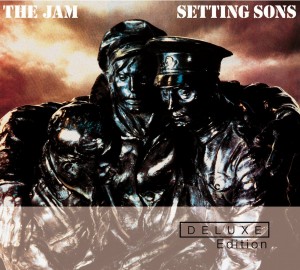1979’s Setting Sons is probably the second finest piece of work released by The Jam during their career, which, on record, spanned from 1977 to 1982 – the finest being their next album, 1980’s Sound Affects. It was on Setting Sons that Paul Weller rightfully, even if not acknowledged at the time as such, took his place as the best (frankly) British lyricist and the inheritor to the throne of Ray Davies and Pete Townshend. Weller was 21 years old at the time, yet he had a sophistication, maturity and poetic sense that none of his (older) contemporaries who sprang from the first wave of punk seemed to have (Pete Shelley would be closest).
A brief history lesson, since The Jam were never successful here as they were elsewhere (which still irritates me) and because this album was the first of the Weller blueprints I used to become a songwriter (not separating critic from avowed Jam historian/fan): The Jam were on a roll since the release of 1978’s All Mod Cons – several hit singles, beginning with their version of The Kinks’ “David Watts” and they’d reached a point where they were poised to break the U.K. top ten. With the leadoff single, the highly-explosive (play at loud volume for maximum enjoyment) “The Eton Rifles” crashing up the British charts to hit Number 3, it set the table for Setting Sons perfectly. Originally envisioned as a concept album, that idea was scrapped as Weller simply didn’t have enough songs threaded together and ready by the time recording commenced. Part of this album’s strength, therefore, goes into the fact that Weller was writing by day and handing the new compositions over to Bruce Foxton and Rick Buckler to shape into a complete work at night. The songs have a “live” feel and an energy that most other Jam releases to that time didn’t. Another big plus is the sound; here, producer Vic Coppersmith-Heaven gave the band a “wider” sound with a live-room feel that the other Jam records didn’t have (too dry and claustrophobic for me). But it’s Weller’s lyrics that give this album the shine and power that he hinted at on such previous tracks as “Down In The Tube Station At Midnight”, “Strange Town” and “The Butterfly Collector” (both of which are included in this deluxe package, as they were released, two singles prior to “The Eton Rifles”. The other single, “When You’re Young” backed with “Smithers Jones” (band version) are also here, as is “See Saw”, the B-side to “…Rifles”).
An example:
“We stole the love from young girls in ivory towers
We stole autumn leaves and summer showers
We stole the silent wind that says you are free
We stole everything that we could see
But it wasn’t enough – and now we’ve gone and spoiled everything
Now we’re no longer as thick as thieves…”
OR even better – written in the form of a letter, when read:
“Oh and by the way I must tell you
Before I sign off, that I’ve got a meeting next week
With the head of a big corporate – I can’t disclose who, but I’m sure you’ll know it
And the burning sky keeps burning bright
And it won’t turn off till it’s had enough
It’s the greedy bastard who won’t give up
And you’re just a dreamer if you don’t realize
And the sooner you do will be the better for you
Then we’ll all be happy, and we’ll all be wise
And all bow down to the burning sky
Then we’ll all be happy, and we’ll all be wise
And together we will live beneath the burning sky”
How many 21 year olds write like that? Simply amazing and eye-opening. If you ever wondered why The Jam connected so well with young people, it was because of Weller’s youthful articulation. He spoke clearly and with passion and on these two songs, “Thick As Thieves” and “Burning Sky”, respectively, it doesn’t get too much more powerful – loss of friendship, the differing of direction and politics with friends after time goes by (in the case of the album’s original concept, the dissolution of a friendship between three friends after a war – one goes to the left, one to the right and the other neutral) – for me, it gave me a very good road map towards real life and the passing of time and how we all change. The other songs that give this album its heightened pace and power include the frenzy and tension of “Private Hell”, the venom and contempt of “Little Boy Soliders” and the hit single, “The Eton Rifles”. The only disposable track was a version of Martha and The Vandellas’ “Heat Wave” (they really should have used “See Saw” instead).
The corresponding singles, as mentioned, are included – although oddly, the band’s Number One monster hit, “Going Underground” and its masterpiece B-side, “The Dreams Of Children” is included as well – which really doesn’t make sense, as it came out in March, 1980 and belongs with the Sound Affects package instead (although that’s not how Polydor did it…). The second disc is a full concert from London’s Rainbow Theatre in December ’79 and is strictly for the fan/completist.
So if you love The Jam as much I have, do and always will, you’ll want this. If you like The Jam, you’ll want this. And if you’re curious about The Jam, this is an excellent place to start. Once a classic, always a classic.
HIGHLY RECOMMENDED
http://paulweller.com/
http://youtu.be/wJRmrlkYdsQ
http://youtu.be/Xdl8hE07sYE






Comments